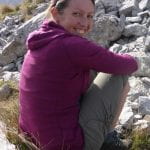Current Final Years
Current Third Years
Current Second Years
Current First Years
Current Final Years
Hannah Romanowski
Studentship led by Rothamsted Research
Hannah graduated from the University of Edinburgh with a BSc in Zoology in 2019, where she did her final project in urban ecology focussing on the effects of urban variables on the diet of red foxes. She has since completed an MSc in Environmental Policy and Management from the University of Bristol.
She will be studying long-term trends in the abundance and phenology of migrating insects, under the supervision of Dr James Bell and the Rothamsted Insect Survey. Trends will be investigated in relation to climate and landscape variables. This will be then linked to population ecology of insectivorous birds and bats, to investigate if these long-term trends are potential drivers of change.
Izayana Sandoval-Carvajal
CASE studentship
Studentship led by Rothamsted Research
Izayana graduated from the University of Costa Rica in 2014 with a BSc in biology, three years later she got a degree in molecular biology and biotechnology, and in 2020 she completed her MSc in bioinformatics and system biology at the same University.
Her experience has been focused on mainly virus expression studies by transcriptomics, and also diagnosis and detection of plant viruses, viroids, and bacteria limited to the vascular system. Additionally, aphid molecular taxonomy and characterization of their bacterial endosymbionts. She is passionate about science and enjoys being constantly learning new things. One of her main interests is to contribute to disease management efforts, especially because in her country agriculture is one of the main economical activities.
Currently, she is a student of the University of Bristol and she is developing her doctoral research in Rothamsted Research where she is determining the source of resistance against Barley yellow dwarf virus (BYDV) in a resistant line of wheat under the supervision of Prof. Kim Hammond-Kosack, Prof Gary Foster and Dr. Chris Burt.
Current Third Years
Natasha Brock
Studentship led by Rothamsted Research
Tash graduated from the University of York with a BSc in Biological Sciences (with a Year in Industry) in 2022. During her Year in Industry, Tash worked in the Novel Human Genetics Research Unit at GlaxoSmithKline. Her final year project with Prof Neil Bruce was characterising the Glutathione detoxification pathway of TNT and Copper in Arabidopsis thaliana at the Centre for Novel Agricultural Products (CNAP).
Tash’s PhD will be based at the Rothamsted Research, supervised by Prof Nigel Halford, with co-supervisors Dr David Withall (Rothamsted) and Dr Gary Barker (University of Bristol). The main aim of her PhD is to use CRISPR/Cas9 to re-engineer wheat to alter its amino acid metabolism.
Nathan Roberts
Studentship led by Rothamsted Research
Nathan graduated from Oxford Brookes University with a BSc in Biology in 2021. During the summer before his final year, he was awarded an SWBio studentship to gain experience in Dr Smita Kurup’s lab at the agricultural research centre Rothamsted Research, where he further developed his interests in plant science. Following completion of his undergraduate degree, Nathan began a research master’s in Dr Keara Franklin’s lab at the University of Bristol, investigating the effects of preharvest, UV-B light treatments on delaying dark-induced senescence.
For his PhD, Nathan will be researching the hormonal and genetic regulatory pathways involved in controlling/increasing ovule numbers in important agricultural crops such as Brassica napus. His project is being undertaken at Rothamsted Research under the main supervision of Dr Smita Kurup.
Anusha Mohankumar
CASE studentship with associate partner: In collaboration with Rothamsted Research + University of the West of England (UWE)
(she/her)
Anusha graduated with a BSc Agriculture Sciences from the University of Agricultural Sciences, Bangalore, in 2018 and an MSc Entomology from Bidhan Chandra Krishi Viswavidyalaya, West Bengal in 2020. Her research focused on understanding the population dynamics of arthropods in the cabbage ecosystem. Post studies, she worked as a junior researcher at Tranalab Pvt Ltd, where she gained experience in molecular cloning, plant transformation and tissue culture.
Her research experience and passion for helping the agricultural society motivated her to undertake the PhD under the Syngenta CASE Project, which aims to identify semiochemicals in soil. The semiochemical blends identified through the project act in a non-toxic mode of action and can provide an environmentally benign alternative for the management of wireworms. This project is supervised by Dr Jozsef Vuts (Rothamsted Research), Dr Pete Maxfield (the University of the West of England) and Dr Benedikt Kurtz (Syngenta).
Current Second Years
Afsal Ayoob Khan
Studentship led by Rothamsted Research
Afsal is a BSc-MSc (integrated) Climate Change Adaptation graduate from College of Climate Change and Environmental Science (CCCES), Kerala Agricultural University, Thrissur, India. He also has a master’s degree in Sustainable Agriculture from the University of Padua, Italy and PG Diploma in Sustainability Science from Indhiragandhi National Open University, New Delhi, India. He is interested in the field of climate change in relation to the environment and livestock sector, focusing on its impact, adaptation and mitigation strategies that enable to reduce the negative impacts pertaining to the changing climate scenario.
An experienced professional with expertise in areas such as climate change, sustainable agricultural production, and environmental management, Afsal has published several scientific articles in internationally reputed journals and has had abstracts in national and international conferences. He attended several international conferences/symposiums within the country and abroad. He specialises in climate change and livestock production, with a primary focus on developing interventions to reduce enteric methane emissions from livestock. His research is under the supervision of Dr. Daniel Enriquez-Hidalgo (University of Bristol), Dr. Jordana Rivero (Rothamsted Research) and Dr. Christopher Browne (ZELP Co.) and will focus on interventions to reduce enteric methane emissions in the early life of cattle, supported by ZELP CASE Project. This is rooted in a deep commitment to addressing one of the most pressing challenges of our time: mitigating the environmental impact of the livestock industry while ensuring sustainable agricultural practices.
Suleiman Mustapha
Standard studentship with associate partner: In collaboration with Rothamsted Research + Swansea University
Suleiman holds a Master of Science in Crop Protection from the University of Ilorin, Nigeria, where he studied the effects of horizontal and open vertical farming on predatory-prey interactions and the suppression of whiteflies infesting tomatoes. Ever since, he has grown considerably interested in sustainable pest management and chemical ecology, especially in arthropod-plant interactions and in exploiting olfactory cues such as identified herbivore-induced plant volatiles in manipulating pests’ behaviour and also in recruiting the third tropic level.
His research under Dr Sam Cook and Prof Tariq Butt will focus on developing volatile semiochemicals that would serve as repellents, attractants and/or bioinsecticides in the control of establishment pests in oilseed rape, with an overall aim of reducing pesticide usage, improvement of pest management strategy in oilseed rape and also in boosting confidence amongst farmers in the production of the crop.
Jade Smith
Studentship led by Rothamsted Research
Jade graduated from the University of Bristol in 2023 with an MSci in Biological Sciences. Throughout this time, she became interested in plant pathology with her final year project aiming to increase the genetic manipulation toolkit available for Armillaria mellea. Jade’s interest in fungal diseases of plants also extended to her work experience at Rothamsted Research where she characterised the function of genes in the fungal pathogen of wheat, Gaeumannomyces tritici.
Jade’s PhD project, under the supervision of Professor Kim Hammond-Kosack and Dr Hans-Wilhelm Nützmann, aims to identify the sub-cellular localization of effector proteins secreted by Fusarium graminearum, the causal agent of fusarium head blight. A bioinformatics pipeline will be utilised to predict their localisation, and this will be confirmed using fluorescent protein tags and confocal microscopy. Identification of the sub-cellular localisation of effector proteins can help to identify their function and subsequently inform development of control strategies.
Current First Years
Jen Thomas
Jen graduated with a BSc in Astrophysics and Maths, before going on to study for an MRes in Environmental Biology. After spending ten years working as a scientific data manager supporting researchers working at the Poles, she recently completed an MSc in Entomology during which she studied the biogeography of Orthoptera in the Pyrenees.
Jen’s PhD will use a combination of techniques including behavioural ecology, molecular biology, atmospheric modelling, stable isotope analysis and data from the Rothamsted Insect Survey to investigate the migration of aphids. This project will be based at Rothamsted Research in collaboration with the University of Exeter and the Met Office. It is supervised by Dr James Bell, Prof Chris Bass, Dr Catherine Bradshaw, Dr Liz Dixon, Dr Jana Friedrich, Dr Dion Garrett and Dr Debbie Hemming.
Adilia Shakirova
Studentship led by Rothamsted Research
A recent graduate from the inaugural cohort of the EU CONEXUS Joint Masters Programme in Marine Biotechnology, Adilia studied and researched in five European countries before joining the SWBio DTP. Her BSc thesis focused on the isolation and characterisation of a new marine bacterium-bacteriophage system; her MSc thesis focused on the use of inducible promoters to study metabolism in a thermophilic acetogenic bacterium. Her PhD project will be dedicated to researching compounds with antifungal activity produced by Pseudomonas species against wheat pathogens. This project will be conducted at Rothamsted Research following an initial placement at the University of Bath. Adilia is going to use bioinformatics tools to find biosynthetic gene clusters with putative antifungal activity in bacterial genomes, and then apply molecular biology and microbiology methods to test biological activity of the isolates. The project will also involve analytical chemistry methods applied to elucidate the structure of the bioactive molecules.
Anderson
Studentship led by Rothamsted Research
(they/them)
Anderson is a PhD candidate studying potential Take-All resistance genes in ancestral wheat collections with Dr Kim Hammond-Kosack of the Rothamsted wheat group. They graduated from the University of Dundee with first class honours in their BSc Biological sciences. Their undergraduate project was carried out at the James Hutton Institute working under Dr Martin Balcerowicz where they studied the Arabidopsis thermomorphogenic response focusing on the GH3 and YUC gene families. They also attended the Gatsby plant sciences summer school in 2022 and undertook a summer internship with the International Barley Hub studying an EMS population as part of the BEST-CROP project. They also achieved the John Raven award for plant sciences at Dundee.
Their academic interests are in plant genetics and statistics and especially the societal applications of research. Their personal interests include reading, hiking and fossil hunting as well as visiting the occasional botanic garden.
